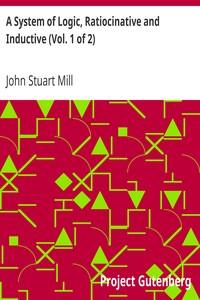Read this ebook for free! No credit card needed, absolutely nothing to pay.
Words: 190957 in 25 pages
This is an ebook sharing website. You can read the uploaded ebooks for free here. No credit cards needed, nothing to pay. If you want to own a digital copy of the ebook, or want to read offline with your favorite ebook-reader, then you can choose to buy and download the ebook.


: A System of Logic Ratiocinative and Inductive (Vol. 1 of 2) by Mill John Stuart - Science Methodology; Knowledge Theory of; Logic Philosophy
PREFACE TO THE FIRST EDITION.
This book makes no pretence of giving to the world a new theory of the intellectual operations. Its claim to attention, if it possess any, is grounded on the fact that it is an attempt not to supersede, but to embody and systematize, the best ideas which have been either promulgated on its subject by speculative writers, or conformed to by accurate thinkers in their scientific inquiries.
To cement together the detached fragments of a subject, never yet treated as a whole; to harmonize the true portions of discordant theories, by supplying the links of thought necessary to connect them, and by disentangling them from the errors with which they are always more or less interwoven; must necessarily require a considerable amount of original speculation. To other originality than this, the present work lays no claim. In the existing state of the cultivation of the sciences, there would be a very strong presumption against any one who should imagine that he had effected a revolution in the theory of the investigation of truth, or added any fundamentally new process to the practice of it. The improvement which remains to be effected in the methods of philosophizing can only consist in performing, more systematically and accurately, operations with which, at least in their elementary form, the human intellect in some one or other of its employments is already familiar.
In the portion of the work which treats of Ratiocination, the author has not deemed it necessary to enter into technical details which may be obtained in so perfect a shape from the existing treatises on what is termed the Logic of the Schools. In the contempt entertained by many modern philosophers for the syllogistic art, it will be seen that he by no means participates; although the scientific theory on which its defence is usually rested appears to him erroneous: and the view which he has suggested of the nature and functions of the Syllogism may, perhaps, afford the means of conciliating the principles of the art with as much as is well grounded in the doctrines and objections of its assailants.
The same abstinence from details could not be observed in the First Book, on Names and Propositions; because many useful principles and distinctions which were contained in the old Logic, have been gradually omitted from the writings of its later teachers; and it appeared desirable both to revive these, and to reform and rationalize the philosophical foundation on which they stood. The earlier chapters of this preliminary Book will consequently appear, to some readers, needlessly elementary and scholastic. But those who know in what darkness the nature of our knowledge, and of the processes by which it is obtained, is often involved by a confused apprehension of the import of the different classes of Words and Assertions, will not regard these discussions as either frivolous, or irrelevant to the topics considered in the later Books.
On the subject of Induction, the task to be performed was that of generalizing the modes of investigating truth and estimating evidence, by which so many important and recondite laws of nature have, in the various sciences, been aggregated to the stock of human knowledge. That this is not a task free from difficulty may be presumed from the fact, that even at a very recent period, eminent writers have not scrupled to pronounce it impossible. The author has endeavoured to combat their theory in the manner in which Diogenes confuted the sceptical reasonings against the possibility of motion; remembering that Diogenes' argument would have been equally conclusive, though his individual perambulations might not have extended beyond the circuit of his own tub.
The concluding Book is an attempt to contribute towards the solution of a question, which the decay of old opinions, and the agitation that disturbs European society to its inmost depths, render as important in the present day to the practical interests of human life, as it must at all times be to the completeness of our speculative knowledge: viz. Whether moral and social phenomena are really exceptions to the general certainty and uniformity of the course of nature; and how far the methods, by which so many of the laws of the physical world have been numbered among truths irrevocably acquired and universally assented to, can be made instrumental to the formation of a similar body of received doctrine in moral and political science.
PREFACE TO THE THIRD EDITION.
Several criticisms, of a more or less controversial character, on this work, have appeared since the publication of the second edition; and Dr. Whewell has lately published a reply to those parts of it in which some of his opinions were controverted.
I have carefully reconsidered all the points on which my conclusions have been assailed. But I have not to announce a change of opinion on any matter of importance. Such minor oversights as have been detected, either by myself or by my critics, I have, in general silently, corrected: but it is not to be inferred that I agree with the objections which have been made to a passage, in every instance in which I have altered or cancelled it. I have often done so, merely that it might not remain a stumbling-block, when the amount of discussion necessary to place the matter in its true light would have exceeded what was suitable to the occasion.
To several of the arguments which have been urged against me, I have thought it useful to reply with some degree of minuteness; not from any taste for controversy, but because the opportunity was favourable for placing my own conclusions, and the grounds of them, more clearly and completely before the reader. Truth, on these subjects, is militant, and can only establish itself by means of conflict. The most opposite opinions can make a plausible show of evidence while each has the statement of its own case; and it is only possible to ascertain which of them is in the right, after hearing and comparing what each can say against the other, and what the other can urge in its defence.
Even the criticisms from which I most dissent have been of great service to me, by showing in what places the exposition most needed to be improved, or the arguments strengthened. And I should have been well pleased if the book had undergone a much greater amount of attack; as in that case I should probably have been enabled to improve it still more than I believe I have now done.
Free books android app tbrJar TBR JAR Read Free books online gutenberg
More posts by @FreeBooks


: The Life of Gordon Volume II by Boulger Demetrius Charles - Gordon Charles George 1833-1885; Generals Great Britain Biography







